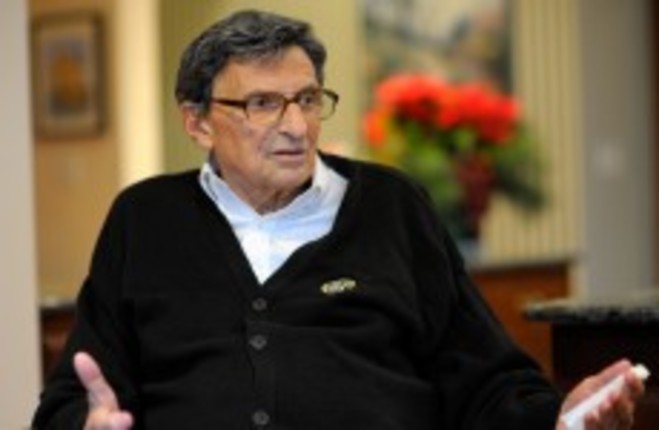HAPPY VALLEY WAS perfect for Joe Paterno, a place where “JoePa” knew best, where he not only won more football games than any other major college coach, but won them the right way: with integrity and sportsmanship. A place where character came first, championships second.
Behind it all, however, was an ugly secret that ran counter to everything the revered coach stood for.
Paterno, a sainted figure at Penn State for almost half a century but scarred forever by the child sex abuse scandal that brought his career to a stunning end, died Sunday at age 85.
His death came just over two months after his son Scott announced on Nov. 18 that his father had been diagnosed with a treatable form of lung cancer. The cancer was found during a follow-up visit for a bronchial illness. A few weeks later, Paterno broke his pelvis after a fall but did not need surgery.
Paterno had been in the hospital since Jan. 13 for observation after what his family called minor complications from his cancer treatments. Not long before that, he conducted his only interview since losing his job, with The Washington Post. Paterno was described as frail then, speaking mostly in a whisper and wearing a wig. The second half of the two-day interview was conducted at his bedside.
His family released a statement Sunday morning to announce his death: “His loss leaves a void in our lives that will never be filled.”
“He died as he lived,” the statement said. “He fought hard until the end, stayed positive, thought only of others and constantly reminded everyone of how blessed his life had been. His ambitions were far reaching, but he never believed he had to leave this Happy Valley to achieve them. He was a man devoted to his family, his university, his players and his community.”
Paterno built a program based on the credo of “Success with Honor,” and he found both. The man known as “JoePa” won 409 games and took the Nittany Lions to 37 bowl games and two national championships. More than 250 of the players he coached went on to the NFL.
“He will go down as the greatest football coach in the history of the game,” Ohio State coach Urban Meyer said after his former team, the Florida Gators, beat Penn State 37-24 in the 2011 Outback Bowl.
Paterno roamed the sidelines for 46 seasons, his thick-rimmed glasses, windbreaker and jet-black sneakers as familiar as the Nittany Lions’ blue and white uniforms. He won 409 games and two national championships.
The reputation he built looked even more impressive because he insisted on keeping graduation rates high while maintaining on-field success.
But in the middle of his 46th season, the legend was shattered. Paterno was engulfed in a child sex abuse scandal when a former trusted assistant, Jerry Sandusky, was accused of molesting 10 boys over a 15-year span, sometimes in the football building.
Paterno at first said he was fooled. But outrage built quickly when the state’s top cop said the coach hadn’t fulfilled a moral obligation to go to the authorities when a graduate assistant, Mike McQueary, told Paterno he saw Sandusky with a young boy in the showers of the football complex in 2002.
At a preliminary hearing for the school officials, McQueary testified that he had seen Sandusky attacking the child with his hands around the boy’s waist but said he wasn’t 100 percent sure it was intercourse. McQueary described Paterno as shocked and saddened and said the coach told him he’d “done the right thing” by reporting the encounter.
Paterno waited a day before alerting school officials but never went to the police.
“I didn’t know which way to go … and rather than get in there and make a mistake…“You know, (McQueary) didn’t want to get specific,” Paterno said. “And to be frank with you I don’t know that it would have done any good, because I never heard of, of, rape and a man. So I just did what I thought was best. I talked to people that I thought would be, if there was a problem, that would be following up on it.”
When the scandal erupted in November, Paterno said he would retire following the 2011 season. He also said he was “absolutely devastated” by the abuse case.
“This is a tragedy,” he said. “It is one of the great sorrows of my life. With the benefit of hindsight, I wish I had done more.”
But the university trustees faced a crisis, and in an emergency meeting that night, they fired Paterno, effective immediately. Graham Spanier, one of the longest-serving university presidents in the nation, also was fired.
Paterno was notified by phone, not in person, a decision that board vice chairman John Surma later regretted, according to Lanny Davis, an attorney retained by the trustees as an adviser.
The university handed the football team to one of Paterno’s assistants, Tom Bradley, who said Paterno “will go down in history as one of the greatest men, who maybe most of you know as a great football coach.”
“As the last 61 years have shown, Joe made an incredible impact,” said the statement from the family. “That impact has been felt and appreciated by our family in the form of thousands of letters and well wishes along with countless acts of kindness from people whose lives he touched. It is evident also in the thousands of successful student athletes who have gone on to multiply that impact as they spread out across the country.”
Paterno believed success was not measured entirely on the field. From his idealistic early days, he had implemented what he called a “grand experiment” — to graduate more players while maintaining success on the field.
– AP

